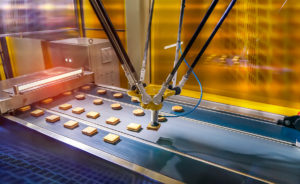Overview
- The food and beverage industry’s future lies in smart manufacturing technologies that will automate operations and drive growth.
- True success for food companies will occur when smart manufacturing trends are integrated into critical business systems like ERPs.
- Mobile barcoding, traceability and operational agility are important when embracing smart manufacturing trends.

The food and beverage industry continues to face substantial change and unprecedented disruption. Organizations are seeing increased inventory management issues and are faced with the reality that they must do more with less.
Now is the time for smart manufacturing to become ingrained in the food and beverage production industry.
Current trends in smart manufacturing within food production include:
- Farm-to-fork tracking
- Traceability to field services and delivery
- Smart factories utilizing robotics
- Laser-guided vehicles (LGVs) and the Internet of Things (IoT)
While the potential of these trends is real, food and beverage manufacturers must proceed with caution and strategy when it comes to adoption. To truly embrace the impact of smart manufacturing, organizations must first focus on the seamless integration of this technology within their critical business systems.
DOWNLOAD THE GUIDE: Total inventory visibility/control with mobile barcoding »
Here are three things to consider when it comes to adopting smart manufacturing in the food and beverage industry:
1. Use mobile barcoding to build the connection
When utilizing smart technology, mobile barcoding allows up-to-date inventory changes as transactions occur. Tracking these movements creates highly accurate and reliable traceability paths that instantly update an ERP system.
This type of integration allows facilities to shift production quickly to accommodate demand and shortages. Fully tracking all touch points across the inventory life cycle keeps records up to date and increases operational agility.
2. Understand the importance of traceability
Traceability is a major benefit of smart manufacturing and should be a top priority for all food manufacturers. It empowers organizations to act quickly, with correct information, in the event of a recall or food safety issue.
Mobile inventory tracking ensures all products are recorded, making it easier to locate potentially contaminated inventory. Manufacturing traceability software allows a food production facility to track – down to the ingredient level – what is on the shelves and may be compromised. Without this kind of smart technology integration, an organization may be faced with pulling the entire batch, leading to decreased productivity and profitability.
Further, traceability can enhance field mobility issues. With flexible online and offline solutions, workers can be connected even in remote locations. This ensures no transaction is lost, even when connectivity falters.
SUCCESS IN ACTION: How Trident Seafoods Established Sound Offline Data Collection »
3. Embrace operational agility and production shift
Now, more than ever, food companies must pivot priorities quickly to ensure business success. A sound supply chain management strategy, coupled with mobile inventory solutions/mobile inventory management software, enables real-time information and visibility throughout the warehouse and delivery funnel. Manufacturing entities can rapidly shift production to accommodate changes in demand, unexpected shortages or stops and more.
One customer, in consumer goods packaging, saw rapid growth in production needs during the pandemic. Through the use of digital supply chain software, the company was able to quickly adjust work assignments to accommodate demand.
ALSO READ: RFgen Supply Chain Experts Discuss COVID-19 Impact on Food and Beverage »
Ensure Your Critical Business Systems Are Part of the Equation
Smart manufacturing is the way of the future. Being able to successfully incorporate data points across the inventory life cycle will be critical. But the process of embracing this level of change and ensuring proper integration with integral systems can be overwhelming.
To begin, start at the basics. Ensure you have the proper ERP system in place. Then, focus on cost-effective technologies, like mobile barcoding technology, that can help you streamline data points across your organization.
By prioritizing this foundation, you’ll be better prepared to embrace the impact of smart manufacturing trends and automate your operation.






